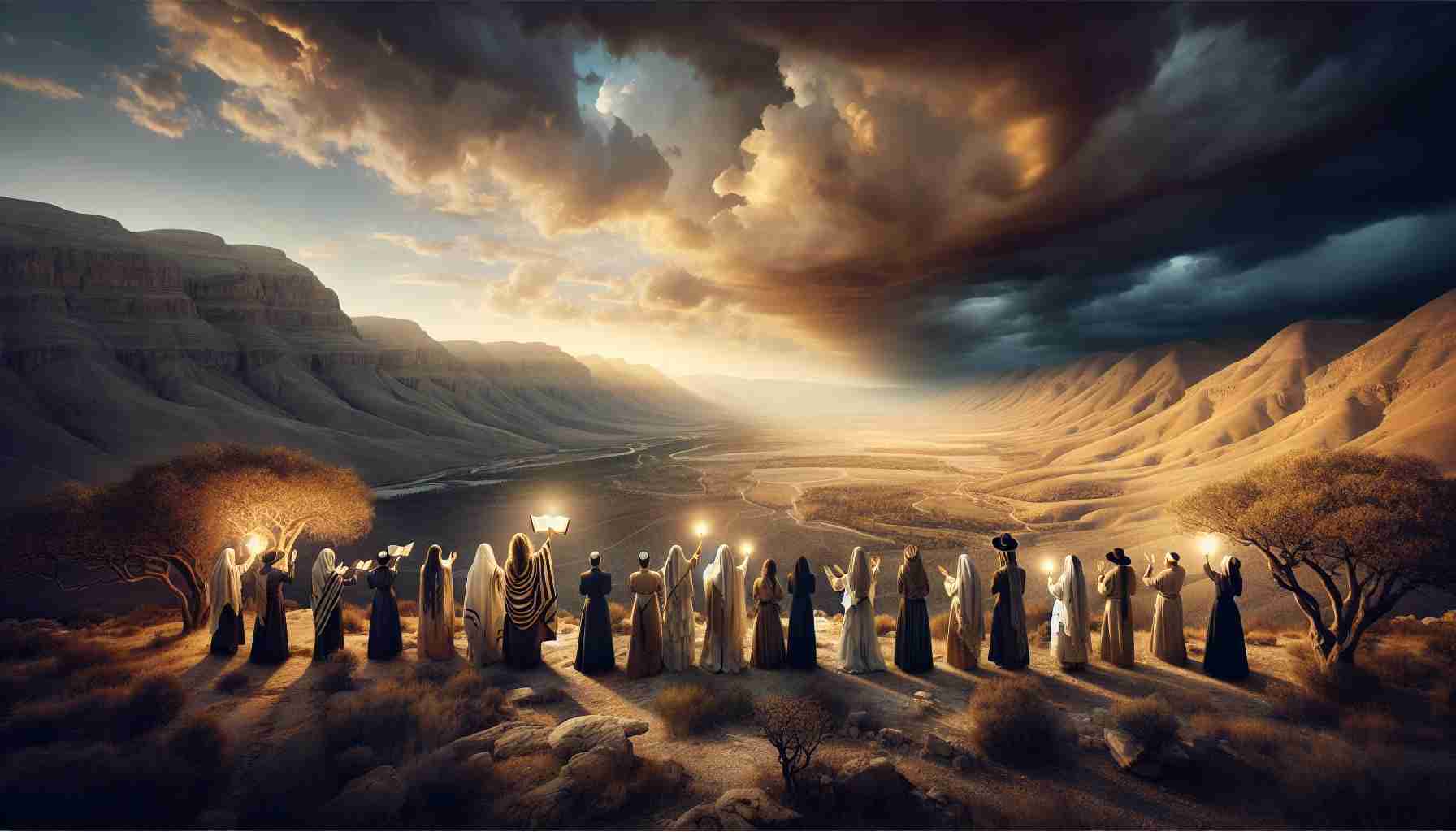

It began with a breeze rustling through the fig trees. I was just twelve, crouched behind my abba’s tent, sulking over a broken bowstrap. That’s when I heard the voice of Moshe — you may know him as Moses — rising above the crowd.
My name isn’t in the Torah. I was just a boy, one of thousands camped on the plains of Moav, just across the Yarden River. The Promised Land felt so close I imagined I could smell milk and honey on the wind.
But Moshe wasn’t speaking of milk or honey. He was warning us.
“If you obey the Lord your God,” he said, “blessings will come upon you and overtake you.”
His voice trembled with power. “But if you do not obey…the sky above will be bronze and the earth below iron.”
I crept closer, my heart pounding like war drums. I had heard stories of Egypt, of slavery, of how Pharaoh had drowned in the sea when he tried to chase us. And I’d thought those days—days of punishment—were behind us. But Moshe reminded us that choices matter. Every day, everywhere.
He told us that if we followed the mitzvot—the sacred commandments—blessings would fall like rain from heaven: healthy harvests, victory over enemies, peace in the land. But if we turned away… curses would come. Starvation. Exile. Fear.
I stared at the grown-ups. Some stood tall, determined. Others looked uneasy. My ima wiped her hands on her apron, whispering a prayer.
That night, I couldn’t sleep. I lay on my cloak, staring at the stars. I thought about the road ahead—the road to the land Hashem had promised our ancestors like Avraham and Sarah. Would it be filled with joy or sorrow?
The next morning, I asked my abba, “Why would anyone choose curses?”
He looked at me for a long time. “It doesn’t seem like a choice,” he said. “But people forget. They get proud. They think they don’t need God. Or they chase after things that feel good at the moment, even if they know they’re wrong.”
I didn’t want to forget. I didn’t want to be cursed.
So I made my own choice. From that day forward, I listened more carefully when the elders taught. I tried harder to help my ima with the lentils, to speak kindly, to keep the Shabbat holy.
Many years later, when my own children were born in the Land, I took them to the hills of Gerizim and Eval. Just like Moshe had commanded, the tribes stood there—half on one hill, half on the other—and they shouted the blessings and curses across the valley for all to hear.
And I whispered to my sons, “You get to choose. Just like I did.”
Blessing or curse.
And that choice, simple as it seemed that day, still echoes through every field, every home, and every beating heart in Israel.
It began with a breeze rustling through the fig trees. I was just twelve, crouched behind my abba’s tent, sulking over a broken bowstrap. That’s when I heard the voice of Moshe — you may know him as Moses — rising above the crowd.
My name isn’t in the Torah. I was just a boy, one of thousands camped on the plains of Moav, just across the Yarden River. The Promised Land felt so close I imagined I could smell milk and honey on the wind.
But Moshe wasn’t speaking of milk or honey. He was warning us.
“If you obey the Lord your God,” he said, “blessings will come upon you and overtake you.”
His voice trembled with power. “But if you do not obey…the sky above will be bronze and the earth below iron.”
I crept closer, my heart pounding like war drums. I had heard stories of Egypt, of slavery, of how Pharaoh had drowned in the sea when he tried to chase us. And I’d thought those days—days of punishment—were behind us. But Moshe reminded us that choices matter. Every day, everywhere.
He told us that if we followed the mitzvot—the sacred commandments—blessings would fall like rain from heaven: healthy harvests, victory over enemies, peace in the land. But if we turned away… curses would come. Starvation. Exile. Fear.
I stared at the grown-ups. Some stood tall, determined. Others looked uneasy. My ima wiped her hands on her apron, whispering a prayer.
That night, I couldn’t sleep. I lay on my cloak, staring at the stars. I thought about the road ahead—the road to the land Hashem had promised our ancestors like Avraham and Sarah. Would it be filled with joy or sorrow?
The next morning, I asked my abba, “Why would anyone choose curses?”
He looked at me for a long time. “It doesn’t seem like a choice,” he said. “But people forget. They get proud. They think they don’t need God. Or they chase after things that feel good at the moment, even if they know they’re wrong.”
I didn’t want to forget. I didn’t want to be cursed.
So I made my own choice. From that day forward, I listened more carefully when the elders taught. I tried harder to help my ima with the lentils, to speak kindly, to keep the Shabbat holy.
Many years later, when my own children were born in the Land, I took them to the hills of Gerizim and Eval. Just like Moshe had commanded, the tribes stood there—half on one hill, half on the other—and they shouted the blessings and curses across the valley for all to hear.
And I whispered to my sons, “You get to choose. Just like I did.”
Blessing or curse.
And that choice, simple as it seemed that day, still echoes through every field, every home, and every beating heart in Israel.